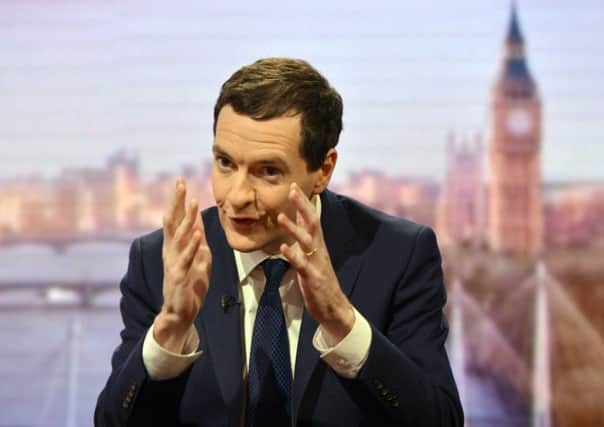David Maddox: Converting recovery into party capital


But while George Osborne may be smiling tomorrow as he delivers his penultimate major economic statement before next year’s election, he will be facing an extraordinarily difficult political task.
The trouble for Mr Osborne and the Conservative Party – and even more so for their Lib Dem coalition partners – is that economic recovery has not translated into political capital. Lord Ashcroft’s poll yesterday merely confirmed that the Tories still lag behind Labour, despite the opposition having a leader who has been under siege – while the Lib Dems are stuck on 7 per cent.
Advertisement
Hide AdAdvertisement
Hide AdThe main issue is that rising costs have not been matched by rising wages, which means that the economic recovery has not translated into people’s pockets.
CONNECT WITH THE SCOTSMAN
• Subscribe to our daily newsletter (requires registration) and get the latest news, sport and business headlines delivered to your inbox every morning
That and a perception of weak political leadership from the major parties has fed into a feeling of anti-politics which sees the SNP top the polls in Scotland while in England Ukip are regularly polling at around 15 per cent.
The Ukip question is the one which Tory backbenchers frantically want the Chancellor to find an answer to.
At a dinner attended by this writer last week with three senior Tory backbenchers, there was a fear that Ukip are at “the tipping point” which the SNP passed in Scotland around 2006.
As one put it: “We are at the point where people are beginning to think that if they vote Ukip they get Ukip. Our best argument at the moment is that if you vote Ukip you get Labour, but if we pass the tipping point we could see voters haemorrhage away.”
So what can the Chancellor do? Many of his backbenchers would like him to bring forward plans to raise the threshold for the higher tax rate of 40p, which many middle earners have been dragged into in recent years.
More than anything this would galvanise Conservative voters and get them back into the fold, the argument goes.
Advertisement
Hide AdAdvertisement
Hide AdBut there is a great deal of concern that since the idea was floated by David Cameron in his conference speech in October, it hasn’t been mentioned again.
Indeed, all those wishing for its introduction know that it won’t happen because the Lib Dems in the government will veto it. Deputy Prime Minister Nick Clegg launched another attack on “Tory tax cuts” yesterday.
So while Mr Osborne knows what he needs to do to make a push against the Ukip threat in May, his hands are tied to a large extent, which leaves him with a very difficult task this week.
SCOTSMAN TABLET AND IPHONE APPS